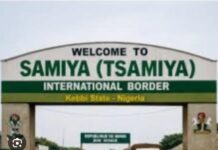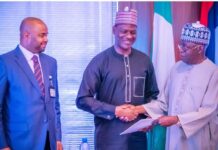
I am pleased to chair this month’s Power Sector meeting and to welcome all of you here present.
This is the 26th meeting we are holding and its continuing nature is consistent with our road map of incremental, stable and, eventually, uninterrupted power.
We are on a journey to a destination of promise and eventual prosperity and I use this occasion to salute the efforts and contributions of all those who have brought us this far.
Even if those who were most vocal in condemnation when the situation appeared very dire are now uttering some muted acknowledgment that it has improved, we must continue to draw inspiration from well-meaning and right thinking Nigerians who were gracious enough to publicly acknowledge that:
- a) They are saving some money from Diesel they used to spend for generators;
- b) They are running their generators for fewer hours; and
- c) They are getting comparably more power than before.
It is because of those gracious and well-meaning and right thinking Nigerians that we must dig deeper, work harder and be more determined to improve service delivery.
In order to improve service, we must accept our respective responsibilities and this is important for the purpose of identifying our respective roles and tasks.
At the risk of repetition and for the sake of clarity, let me state that since the privatisation process of 2013, Generation of Power and Distribution, which is supply to homes, offices and markets, factories and consumers generally is now a private sector business.
The exceptions are the NIPP Projects, which the Federal Government is trying to complete and dispose of, and Yola Distribution Company, which the investor surrendered.
Otherwise, the role of Government is to buy Bulk Power through NBET and vest in Distribution Companies to retail to consumers, and to transport the power from the generation companies to the distribution companies.
Government, through NBET and TCN, is executing these tasks by signing Power Purchase Agreements (PPAs) with Prospective Power Generators, where the terms are agreeable.
It is investing in the expansion of the Transmission Capacity through TCN, by building more Substations and expanding existing ones, to improve service capacity where the Consumer demand has increased, and reinforcing the capacity of existing transmission lines.
At the moment, there are over 90 (ninety) TCN projects for transmission expansion, which TCN will be commissioning nationwide in the next few weeks and months. Some are completed and some are nearing completion.
Today, we will commission two of such projects, namely:
- The expansion of Umuahia sub-station with a new 40MVA transformer to increase transmission capacity from 80 MVA to 120MVA to serve Umuahia, Isikwutor, Isukwuato, Bende, Umunneochi, Ikwano, Obowo, Ohafia and parts of Arochukwu among other places ; and
- The expansion of Aba Sub-station with a new 60MVA to increase service capacity from 127. 5 MVA to 187.5 MVA to serve Aba North and South, Ukwa East and West, Osisioma, Obioma-Ngwa, Isi ala Ngwa and environs.
And these are examples of our commitment to service delivery.
The same is also true of NDPHC, who have over 100 (one hundred) Distribution Projects in various stages of completion, under the NIPP.
Over the next few weeks and months, they will be going out to commission and energize those projects.
They will help the DisCos improve power supply and service delivery to those communities, and I appeal to the DisCos involved to take ownership of these facilities and put them to use.
On my part, I will do my best to keep track of developments and report them to the meeting.
NBET, on its part, must also improve on the timelines it takes to process payment to the DisCos and, in addition, adopt a business orientation of ensuring that it collects as much as it can from the DisCos, who help her to retail the Bulk Power.
The truth is that if NBET cannot pay her bills to the GenCos, the DisCos will have no business because the bulk of their power comes from NBET.
Therefore, the DisCos must, in their own very best interest see NBET as the goose that lays their golden egg, who must not die.
While NBET, TCN and NDPHC act for Government to implement its enabling role, the immediate tasks of the DisCos, in my view, are to:
- A) Improve the quality and capacity of the distribution equipment to improve power supply and service to stimulate consumer willingness to pay;
- B) Improve collection of revenues without extortion through estimated bills or hostility;
- C) Remit what they collect in accordance with the agreement with NBET;
- D) Take ownership of the Meter Asset Provider Regulations to improve supply of meters; and
- E) Respond to consumer complaints and resolve them in a business-like manner.
On this last matter of consumer complaints, let me say that we are getting a number of them in the ministry in Abuja, from different parts of the country.
They should appropriately go to the DisCos and the private investors who own them.
Government has handed over these assets as a business and no longer collects revenue for power from consumers since the sale of PHCN in 2013.
Those who bought the DisCos and bill consumers must rise up to the responsibility of resolving consumer complaints.
Ladies and Gentlemen, these are some of the things that we all must do to improve service delivery, but they are not exhaustive.
Citizens and communities where we are building transmission lines must help to give us access to land.
I am happy to say that some Governors have responded admirably across party lines.
While it will be invidious of me to try to catalogue what different Governors have done, let me here acknowledge what Governor Okezie Ikpeazu of Abia State has done with his team to help us link a power provider with the traders and consuming business community in Ariaria Market, comprising of 30,000 shops.
Progress is being made on that project, under the joint supervision of Rural Electrification Agency and Abia State Government, and it should be completed this year.
The same is true in Sabon Gari Market in Kano, and Sura market in Lagos.
For these traders, stable power supply for their businesses will no longer be a mirage. It will happen.
It will happen because President Buhari is prepared to work across party lines to serve the ordinary people who work very hard daily and contribute to the task of building Nigeria.
Ladies and Gentlemen, my closing comment in these remarks is to the DisCos.
Get your employees out on the field.
Get them to inspect lines, breakers, transformers and other distribution equipment.
Get them to visit consumers and ask if they have problems, and fix them.
Get them to do preventative maintenance and notify your consumers in advance if it will result in disruptions of service, and state very clearly how long it will take.
I know that it may be difficult, but that is why we took our jobs; to do difficult things and improve people’s lives against the odds.
I know that you can do it, and I wait eagerly with other Nigerians as you roll out to prove us right for vesting these assets in you.
Babatunde Raji Fashola, SAN
Honourable Minister of Power, Works and Housing






